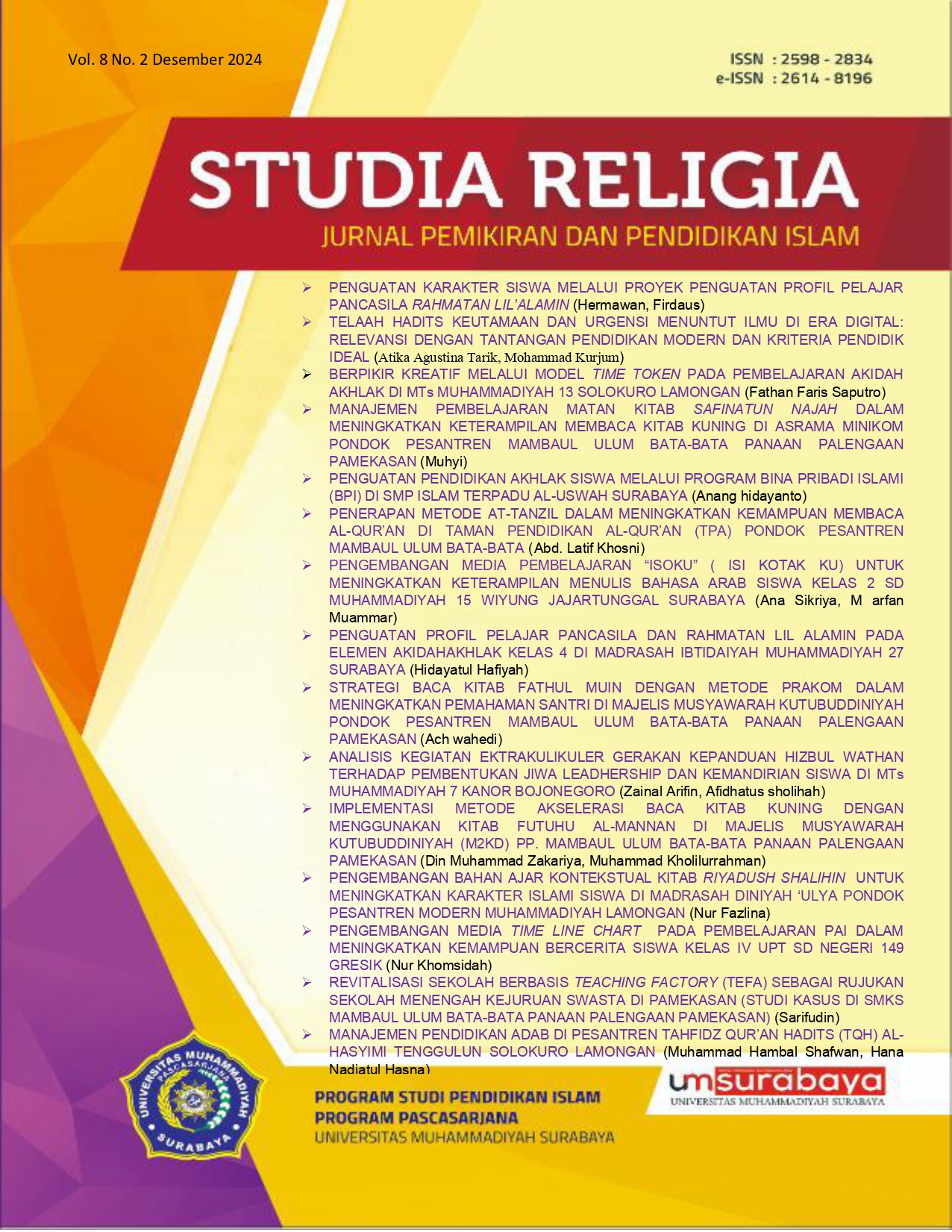TELAAH HADITS KEUTAMAAN DAN URGENSI MENUNTUT ILMU DI ERA DIGITAL: RELEVANSI DENGAN TANTANGAN PENDIDIKAN MODERN DAN KRITERIA PENDIDIK IDEAL
DOI:
https://doi.org/10.30651/sr.v8i2.24034Keywords:
Ilmu, era digital, ilmu haditsAbstract
This study aims to determine how the existence of the study of hadith science on the virtues and urgency of seeking knowledge in the digital era can be used in the application of principles in modern education today. Knowledge is an obligation that will always be attached to a Muslim. Because it can be seen that seeking knowledge is part of worship. The research method used is library research with a historical approach and hadith science, including criticism of sanad and matan to analyze the validity of related hadiths. This study utilizes sources from Maktabah Syamilah and other literature such as books, journals, and articles. Through research with this method, it can be found that the hadith of the Prophet has emphasized the importance of seeking knowledge for every Muslim. However, in the current digital era, where information is easily accessible to anyone, it certainly becomes an awareness for ourselves to need a more critical approach in filtering and utilizing knowledge. In addition, this study discusses the ideal criteria for an educator in the digital era, which include the ability to use technology wisely, assess information critically, and guide students in dealing with social and technological changes. Another thing that is a point of discovery in this study is that the principles of the Hadith of the Prophet can provide solutions to the challenges of education in the modern era today.
References
Adhiguna, Baskoro, and Bramastia Bramastia. “Pandangan Al-Qur’an Terhadap Ilmu Pengetahuan Dan Implikasinya Dalam Pembelajaran Sains.” INKUIRI: Jurnal Pendidikan IPA 10, no. 2 (2021): 138.
Darodjat Wahyudhiana. “Memfungsikan Masjid Sebagai Pusat Pendidikan Untuk Membentuk Peradaban Islam.” Islamadina Volume Xll, no. 2 (2014): 1–13.
Fatmawati, Ira. “Peran Guru Dalam Pengembangan Kurikulum Dan Pembelajaran.” Revorma: Jurnal Pendidikan dan Pemikiran 1, no. 1 (2021): 20–37.
Nata, Abuddin. “Pendidikan Islam Di Era Milenial.” Conciencia 18, no. 1 (2018): 10–28.
Sanad, Analisis, D A N Matan, and Akhmad Baihaqi. “ADAB PESERTA DIDIK TERHADAP GURU DALAM TINJAUAN HADITS (ANALISIS SANAD DAN MATAN).” Tarbiyatuna 9, no. 1 (2018): 62–81. https://journal.unimma.ac.id/index.php/tarbiyatuna/article/view/2420.
Shafwan, M. H., & Baihaqi, I. “STRATEGI INTERNALISASI NILAI IMAN KEPADA ALLAH DI KELAS QONUNI 3 DAN 4 DI KUTTAB AL-FATIH SIDOARJO.” Jurnal Penelitian dan Pendidikan Agama Islam Karang Asem 5, no. 2 (2022): 53–59.
Shafwan, Muhammad Hambal. “HADITH EDUCATION IN FORMING CHARACTER OF EARLY CHILDHOOD.” Studia religia 4, no. 1 (n.d.): 01–11. https://core.ac.uk/download/pdf/327263797.pdf.
———. “IBRAH PENDIDIKAN DALAM KITAB SHAHIH BUKHARI.” Studia religia 5, no. 1 (n.d.): 29–42. http://103.114.35.30/index.php/Studia/article/view/8996.
Solihin, Nandang. “Pendidikan Agama Islam Di Era Disrupsi.” Stitdaarulfatah (2017): 283. http://www.stitdaarulfatah.ac.id/journal/index.php/jmf/article/view/20/17.
Tolchah, Moch. “Studi Perbandingan Pendidikan Akhlak Perspektif Al-Ghazāli Dan Al-Attas.” EL-BANAT: Jurnal Pemikiran dan Pendidikan Islam 9, no. 1 (2019): 79–106.
Downloads
Published
Issue
Section
License
Copyright (c) 2024 Atika Agustina Tarik, Kurjum

This work is licensed under a Creative Commons Attribution-NonCommercial 4.0 International License.
Penulis tetap memegang hak atas karyanya dan memberikan hak publikasi pertama kepada jurnal ini yang secara simultan karya tersebut dilisensikan di bawah:
Creative Commons Attribution-NonCommercial 4.0 International License









